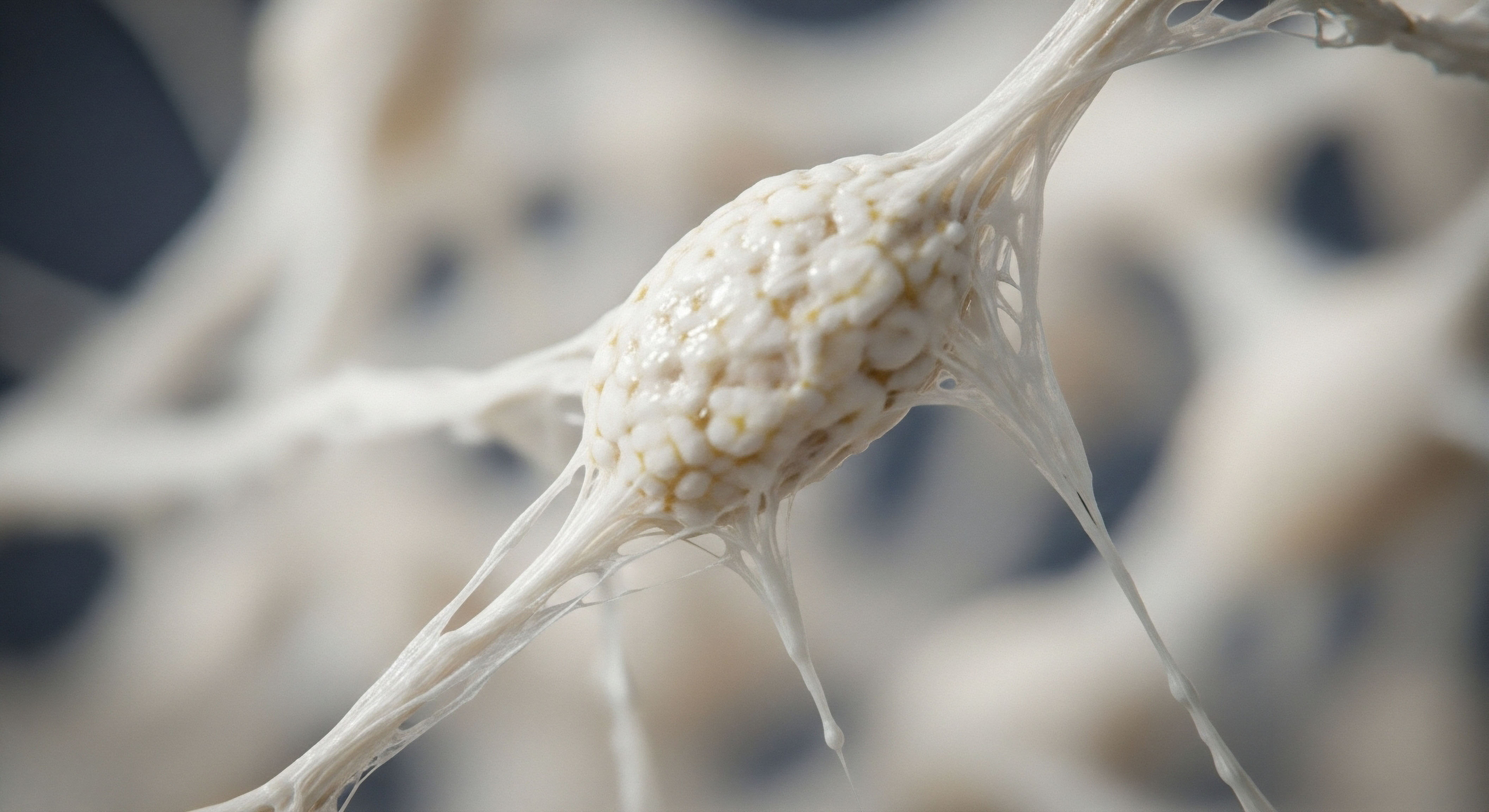

The Internal Ecosystem’s Grand Design
The pursuit of exceptional longevity and peak human performance transcends simplistic measures. True vitality stems from a profound understanding of the body’s intricate systems. We often focus on external inputs ∞ rigorous training, precise nutrition, advanced supplementation ∞ yet an unseen lever dictates the efficacy of these efforts ∞ the gut microbiome.
This internal ecosystem, a vast consortium of microorganisms residing within the digestive tract, orchestrates far more than digestion. It stands as a foundational command center, a biological interface influencing every facet of our healthspan and cognitive prowess.
Recent scientific advancements illuminate the gut microbiome’s profound impact on the aging process. Studies reveal distinct microbial communities in individuals who achieve exceptional longevity, often centenarians, characterized by a greater presence of bacteria producing secondary bile acids. These compounds possess anti-inflammatory properties, offering protection against infections and metabolic diseases. Conversely, a decline in microbial diversity and stability, a phenomenon termed dysbiosis, accelerates the body’s deterioration, marking a significant factor in age-related decline.
The gut’s influence extends into the realm of systemic inflammation, a pervasive condition known as “inflammaging.” This chronic, low-grade inflammation fuels the progression of diseases like Alzheimer’s, cardiovascular conditions, and cancer, acting as a silent accelerant of biological aging. A compromised gut barrier, often referred to as “leaky gut,” allows bacterial components like lipopolysaccharides (LPS) to infiltrate the bloodstream. These microbial fragments trigger a sustained immune response, perpetuating systemic inflammation.
The bidirectional communication between the gut and the brain, the gut-brain axis, highlights another critical dimension of gut mastery. The gut microbiome actively synthesizes neurotransmitters such as serotonin, dopamine, and GABA, regulating mood, memory, and cognitive function. Disruptions within this axis contribute to neuroinflammation, oxidative stress, and early cognitive decline, processes directly accelerating aging. Maintaining a balanced gut therefore improves mental clarity, emotional well-being, and overall longevity.
Centenarians exhibit unique gut microbial profiles, featuring bacteria that produce anti-inflammatory secondary bile acids, a biological signature linked to extended healthspan.

Cellular Signals and Systemic Control
The metabolic byproducts of gut bacteria, particularly short-chain fatty acids (SCFAs) like butyrate, acetate, and propionate, serve as critical signaling molecules. These SCFAs provide a primary energy source for colon cells, maintain the integrity of the gut lining, and regulate immune responses throughout the body. Butyrate, in particular, fortifies the intestinal barrier by stimulating the formation of tight junctions between cells and promoting mucus production, thus enhancing gut impermeability and protecting against pathogens.
Beyond their local effects, SCFAs modulate systemic metabolism, improving insulin sensitivity and reducing the risk of type 2 diabetes. They influence brain health by supporting the blood-brain barrier, reducing neuroinflammation, and regulating neurotransmitter production. This intricate chemical dialogue underscores the gut’s role as an endocrine organ, producing and regulating compounds that impact distal organs and systems, including the hypothalamic-pituitary-adrenal (HPA) axis, influencing stress responses and overall hormonal balance.
The profound interconnectedness extends to the circadian rhythm, the body’s intrinsic 24-hour timekeeping system. The gut microbiome exhibits its own circadian oscillations, which synchronize with the host’s rhythms. Disruptions to this delicate interplay, often from irregular eating patterns or sleep disturbances, precipitate gut dysbiosis and metabolic dysfunction, increasing susceptibility to inflammation and chronic metabolic disorders. Optimizing gut health offers a pathway to re-establish this essential synchronicity, aligning internal processes for peak function.


Engineering Your Gut’s Resilient Core
Mastering the gut microbiome involves a deliberate, scientific approach to its cultivation and maintenance. This process demands a focus on dietary precision, strategic supplementation, and lifestyle calibration. The objective centers on fostering microbial diversity, strengthening the intestinal barrier, and optimizing the production of beneficial metabolites.

Cultivating Microbial Diversity
A diverse and robust microbiome stands as a hallmark of gut health and longevity. Dietary fiber provides the foundational fuel for beneficial gut bacteria. Prioritizing a wide array of fermentable fibers stimulates SCFA production, crucial for gut integrity and systemic health.
- Soluble Fibers ∞ Found in oats, barley, onions, garlic, and legumes. These nourish beneficial bacteria and promote SCFA production.
- Pectin-Rich Fruits ∞ Apples and citrus fruits offer excellent fuel for SCFA-generating bacteria.
- Resistant Starches ∞ Green bananas, plantains, and cooked-and-cooled potatoes, rice, or pasta provide powerful precursors for butyrate production.
Integrating probiotics and prebiotics further refines this internal ecosystem. Probiotics introduce beneficial bacterial strains, while prebiotics supply the specific nutrients these organisms require to flourish. Studies indicate probiotic supplementation can improve cognitive function in healthy older individuals and reduce inflammation. Specific strains, such as Bifidobacterium and Lactobacillus species, are often found in higher abundance in healthy aging individuals and centenarians.
Increasing daily fiber intake by 10 grams correlates with a 13% reduction in frailty risk among older adults.

Fortifying the Intestinal Barrier
The integrity of the intestinal barrier, a single layer of epithelial cells, forms a critical defense against systemic inflammation. When this barrier weakens, it permits bacterial endotoxins to enter the bloodstream, triggering immune activation and contributing to inflammaging. Strategies to reinforce this barrier represent a core component of gut mastery.
Butyrate, a key SCFA, plays a direct role in sealing the gut lining by stimulating tight junction formation and mucus production. This protective layer shields the body from harmful substances and provides a habitat for beneficial bacteria. Dietary interventions rich in fermentable fibers directly support this mechanism.
Beyond diet, managing stress assumes a vital role. Psychological stress compromises intestinal barrier function, leading to increased permeability and systemic inflammation. Chronic stress redirects blood flow away from the digestive system, slows digestion, and alters gut microbiota composition, reducing beneficial diversity. Implementing stress mitigation techniques directly supports gut health and, by extension, systemic resilience.

Hormonal and Metabolic Alignment
The gut microbiome’s role as a virtual endocrine organ dictates its impact on metabolic and hormonal balance. Gut bacteria produce compounds influencing appetite-regulating hormones like ghrelin and leptin, affecting satiety signals to the brain. They also modulate the hypothalamic-pituitary-adrenal (HPA) axis, influencing stress responses.
Maintaining a healthy gut directly influences insulin sensitivity, a cornerstone of metabolic health. Microbial metabolites, including specific bile acids, regulate lipid and glucose metabolism, impacting liver function and glucose tolerance. These intricate feedback loops underscore the need for a holistic approach, where gut interventions translate into broader physiological advantages.
Emerging interventions, such as Fecal Microbiota Transplantation (FMT), offer a powerful, albeit advanced, method for microbial rejuvenation. Animal studies demonstrate that FMT from young, healthy donors can improve gut microbiota diversity and delay aging markers in recipients. While human applications are primarily for specific conditions, the underlying principle ∞ reconstituting a dysbiotic microbiota with a beneficial one ∞ highlights the profound potential of targeted microbial modulation for longevity.


Sustaining Biological Mastery through Time
The journey toward gut mastery unfolds over time, a continuous process of refinement and adaptation. Immediate impacts manifest as improved digestive comfort and enhanced energy, while sustained efforts yield profound, long-term benefits for healthspan and resilience against age-related decline. This commitment to internal optimization redefines the trajectory of aging.

Immediate Realignments
Initial interventions targeting gut health often produce rapid, perceptible shifts. A focused increase in diverse fiber intake can enhance SCFA production within weeks, leading to improved bowel regularity and reduced inflammatory markers. Probiotic supplementation can stabilize gut flora, contributing to better mood regulation and immune responsiveness in a relatively short timeframe. These early victories confirm the gut’s immediate responsiveness to intentional cultivation.
The restoration of circadian rhythm synchronicity, through consistent eating and sleep patterns, also yields swift benefits. Aligning the gut microbiome’s natural oscillations with the body’s central clock improves metabolic efficiency and reduces inflammation, creating a more harmonious internal environment. These foundational adjustments lay the groundwork for deeper, more enduring transformations.

Long-Term Resilience and Longevity
The true power of gut mastery reveals itself across decades. Consistent support for a diverse and healthy microbiome contributes to a sustained reduction in inflammaging, protecting against chronic diseases that accelerate biological aging. Individuals maintaining optimal gut health exhibit greater resistance to neurodegenerative conditions, preserving cognitive function and mental acuity well into advanced years.
The ongoing production of SCFAs and other beneficial metabolites through a fiber-rich diet provides continuous support for cellular health, metabolic regulation, and immune system robustness. This continuous internal support translates into a tangible increase in healthspan, allowing for sustained physical and cognitive performance. Research on centenarians consistently points to resilient, diverse gut microbiomes as a common thread, suggesting that lifelong gut stewardship directly correlates with exceptional longevity.
Sustaining gut mastery requires a proactive, adaptive mindset. Regular reassessment of dietary choices, strategic adjustment of supplementation based on individual needs, and ongoing attention to stress management and sleep hygiene become integral components of a longevity protocol. The gut microbiome, while dynamic, responds to consistent, intelligent intervention. This long-term commitment transforms the internal ecosystem into a powerful ally in the pursuit of an optimized, enduring existence.
The advancements in understanding the gut’s influence on endocrine function, metabolic pathways, and immune surveillance offer unprecedented opportunities for biological optimization. The integration of these insights into a personalized health strategy allows for a targeted approach to extend not just years, but the quality and vibrancy of those years. The future of human vitality lies in mastering these unseen internal levers.

The Enduring Pursuit of Optimized Existence
Our biological potential awaits activation, often concealed within the intricate networks of our own physiology. The gut microbiome stands as a prime example, a complex ecosystem holding sway over our health, cognitive function, and very longevity. We move beyond a passive acceptance of biological decline.
We instead choose a path of proactive optimization, transforming our internal landscape. This deliberate cultivation of a resilient gut ecosystem unlocks a higher state of being, a future where vibrant health and peak performance extend across a remarkable lifespan.



